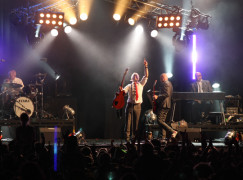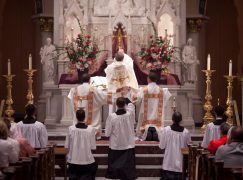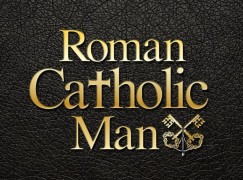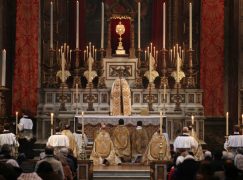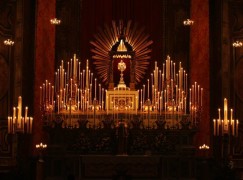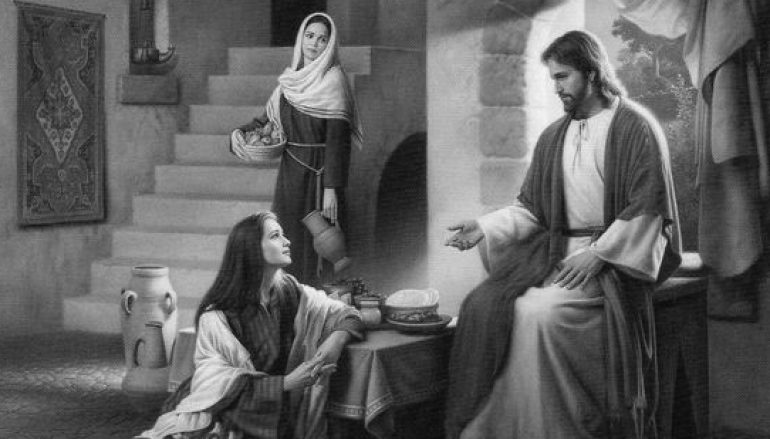

Do You Want To Be “Truly” Happy? Discover the “One Thing Necessary”
Surveys by Gallup, the National Opinion Research Center, and the Pew Organization conclude that spiritually devout people are twice as likely to report being “very happy” than the least religious people. Secular analysts seem to be doing back flips trying to explain away the simple reality that there is no other authentic and fulfilling way to live other than a supernatural life; the Divine Life.
The Greek Philosopher Aristotle (394-322 B.C.) observed that no person deliberately chooses to be unhappy. So, if this is the case, then human beings wish to be happy and the search for happiness leads us to look at what kinds of happiness there might be and whether these types might be logically rank-ordered. From reviewing Greek and later Christian writers it may be observed that happiness has four levels. These may be described as follows (in ascending order).
Happiness Level 1: Laetus (Delighted)
The first and most basic level of happiness comes from things outside ourselves and involve one or more of the five senses. The pleasure they give is immediate and direct (aka, immediate gratification) such as eating an ice cream cone, buying a brand new car, going on vacation. Their pleasure is short lived and intermittent. They must be replaced by yet another ice cream cone, or new car, or vacation. Until such replacements take place our happiness is on hold, if this lower level is the only way we look for happiness.
While many forms of pleasure are not sinful, in and of themselves, some are, or can be. Some forms of pleasure are objectively evil … e.g., viewing pornography. An over-indulgence of something can be sinful … e.g., excessive alcohol consumption. Many can become controlled by the things that give them pleasure, which leads to over-consumption or even addiction. In other words, they find themselves in a place where they are not happy unless they continue their pursuit of the “things” that make them happy.
Spiritually speaking, this over-indulgence or the use of objectively evil things causes a spiritual death (mortal sin), According to the Catechism of the Catholic Church, “mortal sin destroys charity in the heart of man by a grave violation of God’s law; it turns man away from God, who is his ultimate end and his beatitude, by preferring an inferior good to him” (CCC 1855). Furthermore, being in a state of mortal sin further inclines us to do evil. It leaves us with very little defenses against the Devil and our own weaknesses.
This spiritual death also throws us into the malaise of spiritual sloth or “acedia.” Sloth is an evil disposition of the will and of the sensible appetites, by which one fears and refuses effort, wishes to avoid all trouble, and seeks a dolce far niente (“sweetness of doing nothing”). When idleness affects the accomplishment of the religious duties necessary to sanctification, it is called acedia. It is an evil sadness: opposed to spiritual joy, which is the fruit of generosity in the love of God. Acedia is a disgust for spiritual things, a disgust which leads one to perform them negligently, to shorten them, or to omit them under vain pretexts. It is the cause of tepidity (or “lukewarm”). G.K. Chesterton said, “The Mass is very long and tiresome unless one loves God.”
St. John Vianney wrote: “He who lives in sin (mortal) takes up the habits and the appearance of the beasts. The beast, which has not reason, knows nothing but its appetites. So the man who makes himself like the beasts loses his reason, and lets himself be guided by the inclinations of his body … I pity the poor wretches who run after that wind; they gain very little, they give a great deal for very little profit — they give their eternity for the miserable smoke of the world.”
It is no wonder why the world, now mostly disconnected from the Divine Life of God (now taking up the habits of the beasts), can allow the murder of innocent babies, the redefinition of marriage, and men free to enter the restrooms of little girls.
Happiness Level 2: Felix (Happy)
The second level of happiness involves the ego (Ego is Latin for I … egocentric). This kind of happiness comes whenever I am in control, the focus of attention, the object of admiration, whenever I see myself as superior to others. Hence, whenever I win, gain power, am admired, or gain popularity I feel happy and pleased with myself. My ego has been affirmed. That which I think is the most important thing in the world (me) has received approval.
Here we can see that some forms of competition are not sinful (winning a sporting event, receiving an award, working hard to be promoted, etc.), but a preoccupation toward control, attention and admiration can rise to the level sin. This can be seen in such needs as a driving desire to exhibit the best house or the nicest car. There are those who are more concerned with “winning the argument” rather than “winning a soul.” Love, according to St. Thomas Aquinas, is to will the good of another, or wanting them to succeed. When one is caught in this lower level of happiness, thoughts of success are directed only toward one’s self.
Since this self-centeredness directly opposes the will of God, it too can bring a spiritual death to the soul, making it prone to evil, sloth and acedia. Those who are caught in these two lower levels face a great challenge to break free from the prison of self-indulgence and self-centeredness. This is why Jesus led people through Happiness Level #3, in order to break through to Happiness Level #4. Rising to new heights simply *must* begin by moving the focus off of ourselves to others.
Happiness Level 3: Beatitudo (Blessedness)
The happiness that comes from seeing the good in others and doing the good for others. It is, in essence, other-regarding action. Happiness Level #3 is, in some sense, at war with Happiness Level #2. One cannot be at the same time in competition with someone else and doing the good for and seeing the good in them. Most people would prefer a world (community, family, relationships) structured around the pursuit of Happiness Level #3 than entirely based in Happiness Level #2. While Happiness Level #3 is higher than Happiness Level #2, the problem with Happiness Level #3 is that it is necessarily limited. We cannot be someone else’s everything. For example, we or they, will die and if our happiness is contingent upon them, it dies with them. “There must be more than this.”
Think of the great “Sermon on the Mount” (Matthew 5:1-48). It begins with the eight Beatitudes. If you study them closely, they are a call to break free from the control “Happiness Level #1” and “Happiness Level #2” have over people’s lives. From there, Jesus calls us to “spice up people’s lives” (salt of the earth) and to be “lit up” – in a state of grace – as bearers of faith, hope and love (light of the world) in a world so inclined to the darkness of an empty materialism, despair and egotism.
From there, Jesus leads them up and up and up. If we are going to be missionaries of salt and light, we must be people of integrity and truth. We cannot be found with any stain of corruption or duplicity … that is the “way of the world” … it cannot be that way with us. We must be, before all else, humbly orthodox and obedient:
“Do not think that I have come to abolish the Law or the Prophets; I have not come to abolish them but to fulfill them. For truly I tell you, until heaven and earth disappear, not the smallest letter, not the least stroke of a pen, will by any means disappear from the Law until everything is accomplished. Therefore anyone who sets aside one of the least of these commands and teaches others accordingly will be called least in the kingdom of heaven, but whoever practices and teaches these commands will be called great in the kingdom of heaven” (Matthew 5:17-19).
Most of the remainder of the Sermon on the Mount shows what is the “common way of the world,” and how we are called to “transcend” the way of the world to live as “children of God,” even to the point of loving our enemies. But, Jesus concludes with a call to strive for the more: “Be perfect, therefore, as your heavenly Father is perfect” (Matthew 5:48). This sets the stage for the ultimate level of happiness … the level that brings true and lasting happiness to those who “break through” to this level.
Happiness Level 4: Sublime Beatitudo (Sublime Blessedness)
(Sublime = of such excellence, grandeur, or beauty as to inspire great admiration or awe.)
Even the third level of happiness does not exhaust the scope of human desire. Humans are pulled by their desire for the sublime, something beyond their imagination, beyond their complete understanding. To be sure, they desire love, goodness, truth, beauty, and being as they experience them in the world; but they also desire these in their perfected and unlimited form. St. Augustine describes this quest as fides quaerens intellectus: “faith in search of understanding.”
Those of faith recognize this as their desire for God. Not too long ago, my friend, Kris Crouch, wrote this very moving reflection about her journey. I believe this is a beautiful example of how her encounter with the Holy Sacrifice of the Mass, offered with great reverence and sacred beauty, helped her to break through to “Happiness Level #4” …
I used to “shop around” for the “Right church” with the “Right priest” and the “Right people.” Tim and I would joke and call ourselves “Catholic nomads.” We literally hopped around for a decade! Then I got the idea that if I couldn’t find the “right place” that I could make it righter. I tried. I did stuff. But it still wasn’t right. It was so much pressure – Looking, searching, seeking, educating, evangelizing, influencing, convincing, changing – But all the while I did good I didn’t feel I was the good God wanted me to be. Something was missing in spite of all my “work.” [Still in Happiness Level #3]
Then I attended my first Latin Mass. And I cried. I think some of those tears were truly tears of relief. Relief. I finally didn’t have to make up for what was lacking someplace else. Everything was right there. It was perfect. And it didn’t NEED me. I felt small. And oddly it felt so good to be so small. Like a giant load had been lifted off of me [that load is the need to be our own god … now she can hand it all over to her Father in Heaven]. Here at the TLM I can be a mess and needy and broken and I can just be on my knees and begging. I’m a beggar. I guess I’d always longed to be a beggar and just never realized how good it feels. Being small and unimportant is the greatest gift the TLM has brought to me! And I never ever want to be big again.
Saint Francis of Assisi said,
“Man should tremble, the world should quake, all Heaven should be deeply moved when the Son of God appears on the altar in the hands of the priest.”
Kris actually broke through to the Divine Life as she received the “trigger Gift of the Holy Spirit of Awe and Wonder.” Once we enter the supernatural life, we begin to grasp the true reality of God. St. Paul wrote,
“The unspiritual man does not receive the gifts of the Spirit of God, for they are foolishness to him, and he is not able to understand them because they are spiritually discerned” (1 Cor 2:14).
The unspiritual man is the person who acts only by using his or her human faculties (intelligence and will) and who therefore can be wise only in the things of the world. He remains superficial and worldly. This is a heart that has hardened to the supernatural reality of God. Kris felt small, because she now understood “God is big.”
The commentary on 1 Corinthians in the Navarre Bible states,
“The spiritual man is the Christian reborn by the grace of God; grace elevates his faculties to enable him to perform actions which have a supernatural value — acts of faith, hope, and charity. A person who is in the state of grace is able to perceive the things of God, because he carries with him the Spirit in his soul in grace, and he has Christ’s mind, Christ’s attitude. ‘We have no alternative,’ St. Josemaria Escriva teaches, ‘there are only two possible ways of living on this earth: either we live a supernatural life, or we live an animal life. And you and I can only live the life of God, a supernatural life’ (Friends of God).”
War on the Supernatural
The great philosopher, Dr. Alice von Hildebrand, put her finger on the place where the real battle lines are drawn:
“Now let us abolish the terms ‘conservative’ or ‘liberal’, the terms ‘left’ and ‘right’ which are secularistic. I suggest that we say from now on ‘those who have kept the sense of the supernatural and those who have lost it’. That is the great divide; that is the essence. Do you look at the Church and her teaching, whether dogmatic or moral, with a supernatural eye, or do you look at it with secular lenses? That is the divide. Left and right confuses the issue. Let us rediscover the greatness and the beauty of the supernatural and I claim that it is so difficult in the polluted world in which we live, that if we don’t pray for it every single day, we are going to be infected. It is the air that you breathe, the newspaper that you read, the television show that you see, time and again you will see this is a fight and attack on the supernatural.”
In speaking of the need for a New Evangelization, Pope Benedict XVI said, “the true problem of our times is the ‘Crisis of God’, the absence of God, disguised by an empty religiosity.” Before the destructive post-Vatican II trend of stripping out of all things sacred, Catholicism led the way in preparing the souls of the faithful to receive this first and most necessary “trigger” Gift of Awe and Wonder through sacred art, sacred architecture, sacred music and special attention to the sacred offering of the Holy Sacrifice of the Mass.
As I wrote in an earlier article, I’ve come to understand that we have (actually, I believe this is the work of the devil), by and large, removed the very gateway into the Divine Life. I happen to agree with Pope St. Gregory the Great who, wanting to capture the spiritual dynamism of the gifts of the Holy Spirit, posited the following order:
“Through the fear of the Lord, we rise to piety, from piety then to knowledge, from knowledge we derive strength, from strength counsel, with counsel we move toward understanding, and with intelligence toward wisdom and thus, by the sevenfold grace of the Spirit, there opens to us at the end of the ascent the entrance to the life of Heaven” (“Homiliae in Hiezechihelem Prophetam,” II 7,7).
As you can see, the entry point is “Fear of the Lord (or Awe and Wonder).”
What is Fear of the Lord? According to Fr. John Hardon, Fear of the Lord …
“… inspires a person with profound respect for the majesty of God. Its corresponding effects are protection from sin through dread of offending the Lord, and a strong confidence in the power of His help. The fear of the Lord is not servile but filial. It is based on the selfless love of God, whom it shrinks from offending. Whereas in servile fear the evil dreaded is punishment; in filial fear it is the fear of doing anything contrary to the will of God.”
St. Francis de Sales said, “We must fear God out of love, not love him out of fear.” In other words, Fear of the Lord is a fear of ever offending the One we love so much; the One in which we have totally dedicated and devoted our lives; the One Who fills us with awe and wonder in His presence. Fear of the Lord is the entry point; this is the trigger that ignites all of the other gifts of the Holy Spirit.
Without this “trigger,” we are prone to reduce our faith/religion to merely another organization that has a sense of social responsibility (Stuck in Happiness Level #3). Jesus is then reduced to an historic figure to emulate. Mass is just a social gathering that many may say (without saying), “it had better have good entertainment if you are going to make me endure this for an hour” (so someone caught in the sin of acedia would say … and this acedia is at epidemic proportions in our times). Again, all of the supernatural is stripped out and the belief in miracles and the power of supernatural grace is mocked as the ignorance of our ancestors.
Aristotle said, “No one can long remain in sadness without any joy.” So, depriving oneself of spiritual joy through neglect and sloth leaves one desperate to fill that void with inferior pleasures. It is no wonder why we see so many people frantically attempting to fill their lives with every kind of activity and distraction possible, desperately trying to avoid the gloom of emptiness and unhappiness. St. Augustine said, “You have made us for yourself, Lord, and our hearts are restless until they rest in you.”
So, we can see why Satan seems to be winning in our times. He is in the supernatural realm using supernatural powers, while we have surrendered or, simply, ignored ours. We are, by and large, living without the One Thing Necessary.
One Thing Necessary
The “one thing necessary” is the basis for the interior life and constitutes a turning of one’s life entirely over (abandonment) to God once a soul has given way to the Gift of Awe and Wonder (or Fear of the Lord).
In the story of Martha and Mary (Luke 10:38-42), we first see that, amazingly, the Second Person of the Holy Trinity was sitting right in their living room … SITTING RIGHT IN THEIR LIVING ROOM!! Now, Martha appears unmoved and detached, while she is busy with the normal good and noble duties of hospitality (Happiness Level #3), while Mary just STOPS!! Mary sits at the feet of Jesus – a position of servitude – her eyes are locked on his Holy Face, while she hangs on His every word. Mary is actually in adoration, soaking in everything our Lord wants to give her. I like to say that she is Mary-nating – soaking in the outpouring of God’s graces. When Martha objects to Mary’s lack of activity, Jesus says that Martha remains anxious and upset about many things, while Mary chose the better portion; the “one thing necessary.”
Without tailing off into a long discussion about “actuosa participatio” (active participation in the Mass), what Mary is doing more clearly defines active participation by her “engagement,” more so than the busy and disconnected way of Martha.
Martha remains anxious and upset about many things because she has not given way to the “one thing necessary” … Martha has not, like Mary, given way to the Divine Life through the gateway Gift of the Holy Spirit – The Gift of Awe and Wonder. We are all hard-wired to live in a holy communion with Father, Son and Holy Spirit. When we ignore or refuse that “Divine Life,” we will never be fully satiated, fully complete … we will live anxious and upset about many things, because we remain short of our destiny as children of God.
“St. Thomas Aquinas believed that man is more than a composite of body and soul, that his is nothing less than elevated to a supernatural order which participates, as far as a creature can, in the very nature of God. Accordingly a person in the state of grace, or divine friendship, possesses certain enduring powers, the infused virtues and gifts, that raise him to an orbit of existence as far above nature as heaven is above earth, and that give him abilities of thought and operation that are literally born, not of the will of flesh nor of the will of man, but of God” (Fr. John Hardon).
While modernized Catholics have all but completely forgotten the necessity of supernatural grace, our ancestors could not conceive of life without it. “Grace,” wrote Thomas a Kempis, “is the mistress of truth, the light of the heart, the comforter of affliction, the banisher of sorrow, the expeller of fears, the matrix of devotion, the producer of tears. What am I without it but a piece of dry wood and an unprofitable stock, fit for nothing but to be cast away.”
In a recent talk given by George Weigel, he briefly described the work of Rod Stark, the historian of the classical era. Stark asks the question,
“How is it that Christianity converted practically the entire Mediterranean basin in just a few centuries when it was a poor, rag-tag group of nobodies from the dregs of the Empire? The power of Rome was brutal – everyone under its thumb was at its mercy. Christians looked very different. They treated women with dignity and not as property. They cared for the sick, elderly, and widowed. Most of all, they lived joyful, decent lives. Christianity did not “win” through military conquest but through its love of neighbor. It did not win by argument but by example. This is the key to the year of mercy: we must live mercy so that it radiates out from us and spills over into the world. It must touch others and lead them to the truth that our destiny is eternal friendship with God.”
What Professor Stark is referring to is a people literally “lit up” by the power of supernatural grace. These supernaturally illuminated souls cause others to question the darkness of their own souls, and compels them to seek whatever source these Christians have found for living life to the fullest.
Pope St. Pius V summed it up, “All the evils of the world are due to lukewarm Catholics.” If the Second Person of the Most Holy Trinity established the Church, and infused it (us) with the power of the Holy Spirit to transform the world, then an epidemic of lukewarm, unspiritual, Martha-like Catholics would have no power to turn back the darkness of evil.
Let’s say “Good-bye” to a Martha-like lukewarm life of being anxious and upset about many things. God is beckoning us to live a life of “true” happiness. It is a sublime supernatural life that is lived, moment by moment, for no other reason than to please Him … a life that is meant to draw the world to Him by the supernatural joy we so freely offer to everyone we meet, every moment of our day. Let’s help others know the “True Happiness” we have found in the Divine Life; the One Thing Necessary!!


